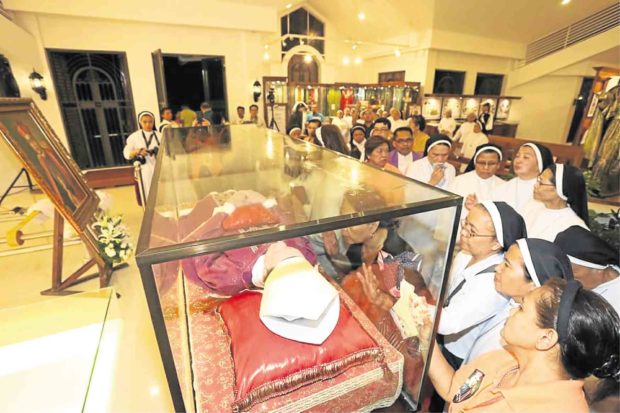
Nuns and other religious leaders view a wax sculpture containing the skeletal remains of Archbishop Teofilo Camomot at Domus Teofilo (House of Teofilo) in Carcar City, Cebu.
JUNJIE MENDOZA/CEBU DAILY NEWS
CEBU CITY—Ana (not her real name) was diagnosed with a neck ailment that disrupted blood flow in her body. She refused to undergo surgery that would cost between P600,000 and P1 million.
She instead entrusted her fate to God and sought the intercession of another Cebuano, who is a candidate for sainthood.
“If you have faith, you’ll get what you want,” she told the Inquirer.
The 64-year-old retired bank employee traveled from her hometown in Barili to Carcar City on Wednesday and joined hundreds of people who trooped to the Daughters of St. Teresa (DST) compound to get a glimpse of the remains of the late Archbishop Teofilo Camomot who was exhumed from his tomb.
“I believe that he is now a saint. I hope he will be officially declared by the Church so that more people will seek his intercession and he could help more people,” Ana said.
A wax statue containing the skull and bones of Camomot was displayed for public viewing after the remains underwent a nine-hour forensic examination by Metro Manila-based experts led by Dr. Erwin Erfe.
Fr. Samson Silloriquez, the Rome-based postulator of the cause of sainthood of Camomot, said the archbishop’s body was already “corrupted.”
“But it doesn’t mean he is not a saint. Even if his body is corrupted, that is not a condition that he is not in heaven,” he said.
Silloriquez said Camomot’s bones were preserved by forensic experts. “We also got some parts of the bones to be used as relics. But these could not be used since he has not been declared a saint at this stage,” he added.
Camomot’s remains were placed on its new tomb after the 4 p.m. Mass presided by Cebu Archbishop Jose Palma on Thursday at Domus Teofilo (House of Teofilo), a museum that houses the personal belongings and writings of Camomot.
Camomot’s body was first exhumed from the Carcar public cemetery in 2009, and was transferred to the compound of the DST, a congregation that he founded.
His remains would be used as relics preserved for purposes of veneration as a tangible memorial in case he would be declared a saint in the long run, church officials said.
Only Palma, some priests, the DST sisters and relatives of Camomot were allowed to witness the examination of the remains. The public was allowed to view Camomot’s remains starting 7 p.m. Wednesday.
In November last year, the Vatican’s Congregation for the Causes of Saints approved the diocesan process for the cause of sainthood of Camomot, who was known for his extreme generosity and love for the poor.
Camomot, fondly called as Monsignor Lolong, died in a vehicular accident in San Fernando town on Sept. 27, 1988. He was 74.